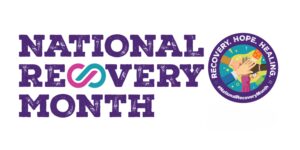
National Recovery Month is celebrated every September to honor those in recovery from substance use and mental health disorders. Started in 1989, the main goal of Recovery Month is to spread awareness and bring hope that recovery is possible with the right treatment, support, and resources.
2024 Theme “The Art of Recovery”
The theme for National Recovery Month in 2024 is “The Art of Recovery”. When our team at Herren Wellness learned of the theme this year, we immediately thought of Mindful Nan, who works with our guests weekly opening pathways to mindfulness and meditation through creativity and art.
We tasked her to bring this year’s recovery theme to life and look forward to unveiling the finished art project at the end of September.
Meet Mindful Nan
Mindful Nan, also known as Nancy Bixby, is a certified Yoga/Meditation teacher, Reiki Level II practitioner and a Certified Zentangle® Teacher (CZT).
Watch as Nan talks about her classes at Herren Wellness and how they prepare guests to utilize mindfulness and meditation techniques as they begin a life in recovery.
The Importance of Mindfulness in Recovery
In a world filled with stimulation, noise, and stress, finding inner peace can feel out of reach. Whether you’re in recovery, facing mental health challenges, or simply seeking to improve your overall well-being and peace of mind, the practices of mindfulness and meditation are powerful tools.
The Mind-Body Connection
There is an intricate relationship between our physical and mental health. Anything that influences the mind also influences the body, and vice-versa. You may have heard the expression ‘the issues are in the tissues’, meaning when we are feeling stressed out, overwhelmed, anxious, depressed, or any other difficult emotion, the symptoms of this can show up in our physical well-being. The connection between stress and heart disease, or muscle tension when stressed are two well-established examples of the mind-body connection.
Because the mind-body connection is so powerful, addressing both mental and physical well-being is essential for sustainable, meaningful long-term recovery and daily peace of mind.
Mindfulness: Cultivating Awareness
Mindfulness is a mental practice rooted in ancient Buddhist traditions that has found its place in modern psychological and therapeutic approaches to mental and physical health well-being. At its core, mindfulness involves nurturing awareness of the present moment without judgment. In the contact of recovery, it plays a pivotal role in several ways, including:

- Reduced Risk of Relapse: Substance use thrives on unconscious, automatic behaviors and impulsive decisions. Mindfulness helps you become more attuned to your thought patterns, internal narratives, emotions, and cravings. This heightened awareness allows you to respond consciously, rather than unconsciously (which literally means ‘without thought’) to negative thoughts and difficult emotions, which reduces risk of harmful, automatic behavior patterns, like reaching for a substance to numb or escape.
- Emotional Regulation: Recovery can be an emotional rollercoaster, with feelings of guilt, shame, remorse, resentment, and anxiety surfacing frequently. Mindfulness practices, such as meditation and deep breathing, help you navigate these emotionally skillfully. Learning to observe feelings, without getting entangled in them, leads to improved emotional regulation and the ability to break harmful patterns.
- Stress Reduction: Stress is one of the most common triggers for harmful behaviors and substance use. Mindfulness practices reduce stress levels in the mind and in the body, making it easier to cope with life’s ups and downs in a more measured, balanced way.
The Science Behind Mindfulness
The effectiveness of mindfulness and breathwork in recovery isn’t speculation; it is supported by a growing body of scientific evidence. Numerous studies have underscored the positive impact these practices have on mental health, recovery, and overall well-being, such as:
- Brain Changes: Neuroimaging studies have shown that mindfulness meditation can lead to structural and functional changes in the brain. These changes are associated with increased self-control, improved emotional regulation, and enhanced decision-making, all of which are vital tools in recovery.

- Mindfulness Based Stress Reduction: Mindfulness-Based Stress Reduction programs have consistently demonstrated their ability to reduce stress, anxiety, and depressive symptoms. Lowering stress levels is pivotal for people in recovery, as it decreases the likelihood of stress-triggered relapse.
- Recovery Enhancement: Mindfulness-based therapies are used in recovery treatment with remarkable success. A study published in JAMA Internal Medicine found that mindfulness-oriented recovery practices significantly reduced substance use and craving.
- Improved Physical Health: Breathwork and mindfulness practices are linked to many physical health benefits, including lower blood pressure, improved lung function, and enhanced cardiovascular health.
About Herren Wellness

Herren Wellness is a thriving community of people at all stages in their recovery journey. We introduce holistic therapies and strategies centered around emotional, physical, and spiritual wellness, in addition to life coaching sessions, family support and an individualized wellness plan to provide a solid foundation in recovery from alcohol and substance use.
We believe that staying connected and community has a lasting impact on recovery, and encourage all alumni to participate in our weekly alumni meetings, seasonal events and annual retreat. Your connection to Herren Wellness doesn’t end when your stay ends; we are there for you throughout your recovery journey.
If you, or a loved one, are looking for help, please call us at (844) 443-7736, email us at info@herrenwellness.com, or register for a 30 minute consultation with our Executive Director, Lori McCarthy. It is never too early or to late to seek help for substance use at any stage.





